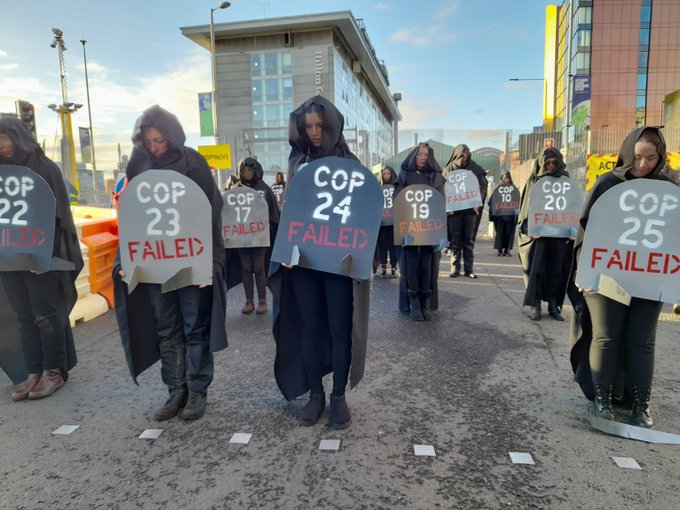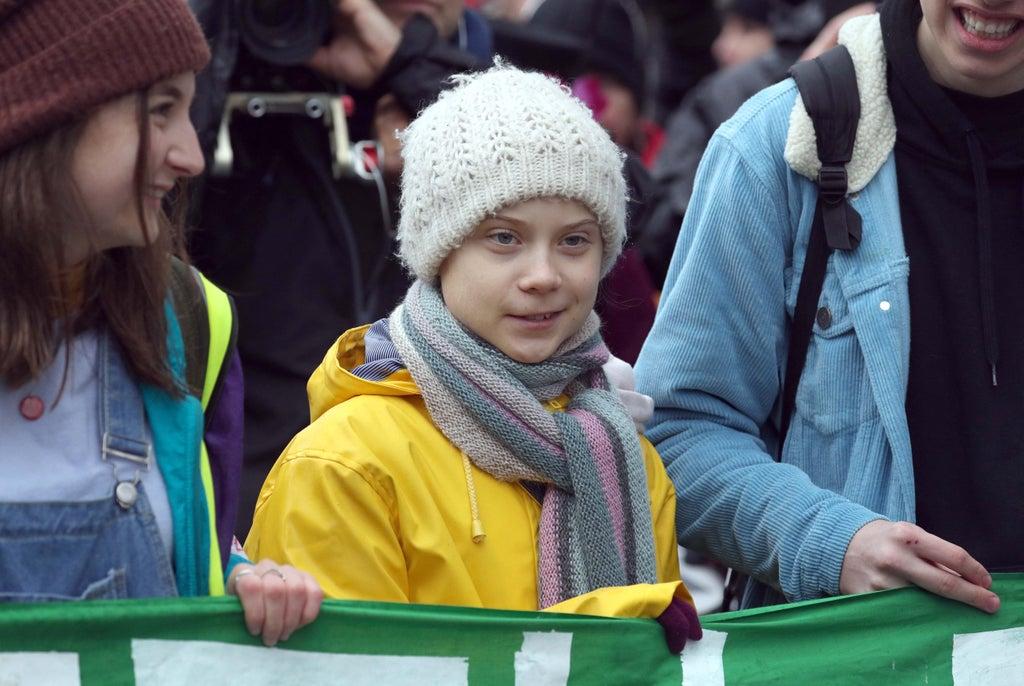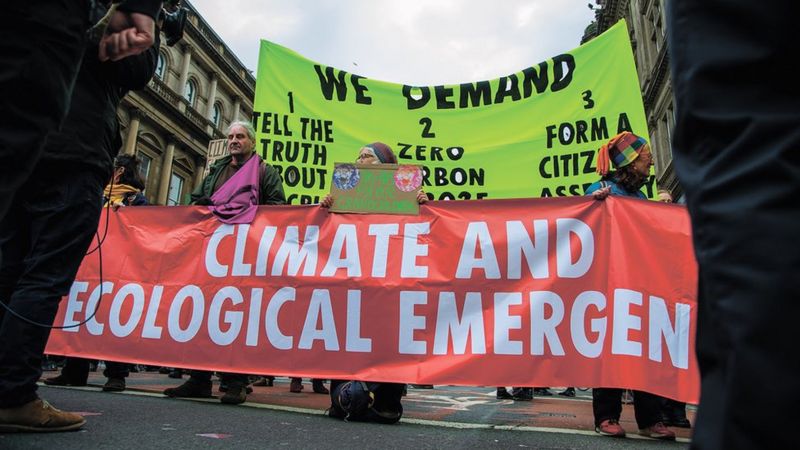From Glasgow to Sharm el-Sheikh, Out of the Ruins of COP26
Quan Nguyen was the Scottish Coordinator of the COP26 Coalition. Here he reflects on lessons learned about protest and movement building in the shadow of COP26.

This time last year , we were getting ready. I remember the police threatening us with arrest for holding a banner at Glasgow Central, where hundreds of climate activists (including Greta Thunberg) were arriving off the train. I remember the desperation with which Scottish activists tried to find accommodation for newly arriving folk, and the laughable “debate” the Scottish parliament had about the Homestay Network, set up for Glaswegians to share rooms with activists. The SNP endorsed it, the Tories warned against it – even though the network was defunct months before COP26, with all rooms booked and thousands of activists still not knowing where they would sleep. I remember the absurdity of hosting a major conference in the midst of the deadly Delta-Covid wave, the indigenous family that was waiting for hours at Edinburgh Airport with nowhere to go, and the stubborn defiance of XR activists readying themselves to set up camp at Bellahouston Park.

Glasgow’s UN Climate Conference, the 26th Conference of the Parties, is, if it is remembered at all, known as the ‘blah, blah, blah’-conference. The non-binding pledge of $100 billion for climate finance, already watered down to avoid any mentions of Loss and Damage from the fires and floods that have already devastated frontline communities, has been forgotten amidst the many other crises governments face. Some express hope that solidarity with those most affected by climate breakdown has only been deferred, and that COP27 in Egypt can “continue the conversation”.
But from the very outset, that conversation at COP27 in Sharm el-Sheikh is set to be a farce, in what Naomi Klein says is the attempted greenwashing of one of the worst police states in the world:
“The Egyptian regime is eager to celebrate its official climate “youth leaders”, holding them up as symbols of hope in the battle against warming. But it’s hard not to think of the courageous youth leaders of the Arab spring, many of them now prematurely aged by more than a decade of state violence and harassment from systems that are lavishly bankrolled by military aid from western powers.”
The cynical use of videos of plastic free straws and biodegradable lunch boxes to gloss over repression, poverty and corruption, propped up by western governments in desperate search for new sources of gas, has never looked more ridiculous – especially against the backdrop of young women currently defying an equally brutal, misogynist, and murderous authoritarianism in Iran. Why should we listen to a word our leaders say about human rights and the oppression of women in Iran if they are providing green cover for the same kind of totalitarianism in Egypt? Hope about a climate conference that is used to prop up Sisi’s regime feels like an insult. Not only to climate activists, but to the young Egyptians that dared to dream of a better future – and often paid for it with their lives.
So, what remains of Glasgow’s COP, in the face of hundreds of new oil and gas licenses set to be approved by the UK government, and a European Union that counts gas and nuclear power as clean energy? For the Scottish climate movement, COP26 was significant not for its watered-down agreements, PR stunts, or marches to nowhere. For us, it was something different: a moment of global responsibility to host the global climate movement in the face of insurmountable obstacles. Facing the deadliest Covid-Waves and incompetent governments, we ensured activists’ and communities health and safety. Facing inept British NGOs that couldn’t shake their London-centrism if their lives depended on it, or their out of depth Scottish NGO counterparts unable to show the leadership required during this global moment, we built a space in Glasgow for activists from across the world. Despite the broken momentum within the protest waves of Extinction Rebellion and Fridays for Future, Scottish climate activists shouldered the responsibility, and prevented our movement from collapsing. And despite all this, we are still here.
In the year after, I am sometimes asked what we can learn from COP26. This question is not only difficult, but barely intelligible given that Scotland will not host a climate conference of this magnitude again. But maybe we can actually learn a good deal from it.
Firstly, the increase in greenwashing language celebrating “climate successes” is hard to keep up with. From selling us technological wonders like Hydrogen, Carbon Capture and Storage, to hijacking concepts like Net-Zero, Build Back Better, and even Just Transition, governments and corporations are eroding our concepts and language quicker than the climate movement can react to it. This can be disorienting and demoralising, as we are not clear anymore on what we are pushing against. Finding a sustained way of debunking “climate successes”, and building a central narrative against greenwashing to prevent conceptual erosion will be central in the years ahead.
*
Secondly: protest in its current form does not work anymore. I shared a panel with Gehan Macleod from Galgael after COP26, where she said that the one thing we should have learned from the Occupy movement is that marches, occupations and mobilisations failed to achieve what they wanted them to achieve. Governments, and often corporations too, can sit out some of the biggest, most disruptive actions and mobilisations successfully. We can see this in waves of XR Rebellions and school strikes, but also in the All-Under-One-Banner independence marches that have been accepted as background drops to the independence debate, and the UCU strikes that did not translate into material gains. Governments and corporations do not have to react meaningfully if they believe their power to be secure enough. Something is missing and figuring out what is crucial for us all.
*
Thirdly, and perhaps relatedly: The climate movement is getting more desperate. Time is running out, and there is no answer or strategy that has successfully challenged fossil fuel capitalism in a fundamental way. As a result, short and desperate acts of attention-grabbing disruptions (which probably won’t sufficiently disrupt business as usual on its own) will become ever-more frequent. At the same time, more and more activists will burn out from these intense bursts of activism.
*
Fourthly, as the tactics of climate activists evolve, police tactics are changing too. This was most visible during COP26, where the police barely made any arrests, but still prevented almost all disruptive action from taking place. They achieved this through a massive intimidating police presence, but also through invading “secure” channels that activists used for communicating actions. There is no need for the police to send undercover police or hack into people’s phones if they can just join a signal group chat and read along as activists argue, plan and conspire. We need to rethink how we can best avoid and outmaneuver police operations while not exposing ourselves to massive risks.
*
Fifth, the escalation of tactics by the climate movement will continue: acts of vandalism and sabotage will become more common, but so will the increasing backlash from governments. While this is not a reason in itself to not escalate tactics, it is important to remember that government crackdowns on protest does not only hit climate activists that might be ready to accept increasing repression: This will impact more vulnerable groups and make it harder for migrant justice groups, trade unions and others to mobilise. All climate activists share a responsibility to take this into account when they plan their next wave of action.
*
And lastly: In the years to come, sustaining hope and courage in activists amidst worsening of the climate crisis will be the key. Keeping open the possibility for radical change, openly challenging the stories by governments and corporations, and imagining a vision of the future without fossil capitalism are central tasks that remain important even after breaching 1.5 degrees. If there is any learning from UN climate conferences, it’s that this cannot be achieved by optimistic narratives that promise success on a mapped-out path, or a fixed theory of change. We need to prevent activists from falling into despair, like they did after COP15 in Copenhagen where they put all efforts into making COP a success. We need to prevent governments dividing us like they did at COP21 in Paris, where the climate movement split in half on whether the Paris Agreement is worth engaging with or not. Outwith UN climate conferences, we need to realise that making demands on our governments often leads nowhere. We need to recognize that the climate crisis will worsen and there is no blueprint for the climate movement to follow towards climate justice.
*
Believe in Spring
The Egyptian activist Alaa Abd El-Fattah, imprisoned since 2011 by the Egyptian government, wrote a letter to a human rights conference in 2017, stating “Unlike me, you have not yet been defeated”. If there is anything to say about climate activists in Scotland after COP26, it is that – despite everything thrown at us at the worst possible time, we have not yet been defeated. Asked for advice for activists outwith the reach of authoritarianism on how they can help, Alaa Abd El-Fattah (describing himself as out of touch and slightly outdated), he states themes for us to follow:
- Fix your own democracy
- Don’t play the game of nations
- Defend complexity and diversity
- Assert your right to be a creator, not consumer
All of these themes (not outdated at all) are something the Scottish climate movement, and perhaps the Scottish left in general, should take to heart. We need to fix our own democracy and refuse our efforts to become a figleaf for our own governments, regardless of how benign the ruling coalition seems. We need to defend the complexity and diversity of our own movement, and create our own spaces, not consume ready-made action plans that lead to nowhere.

I still remember cycling through Glasgow several times with £1000 in cash to hand to the Minga Indigena, an indigenous rights group that did not manage to secure a UK bank account before coming to Glasgow because all NGOs refused to host them, so I had to hand deliver cash for them to buy food. I remember my old colleague trying to put up a wee banner and being surrounded by two security guards and five policemen immediately, questioning her intensely. I remember how my team, overworked and tired for weeks, couldn’t contain our laughter at the absurd debate on whether the Scottish Greens leader deserves two days off during COP26. I remember how at the end of the 12 days, I felt anger – anger about the exhaustion I had to put my team through, at my bosses, at Glasgow City Council, anger about myself and my tiredness.

Scotland’s climate movement is tired and exhausted one year on. But we are still standing and can rise again to challenge the heart of Europe’s fossil fuel capitalism on its own soil. The best way for us to show solidarity with those who need it most is our own defiance, even in the face of defeat. As Mohamed Tonsy, an Edinburgh-based Egyptian writer and activist, says in his new book You Must Believe in Spring:
“The Revolution has had its setbacks, and many failures, but it is not lost, and it is not over. […] even from the midst of the forces of counter-revolution, the revolution can be revived, and the people’s cries of ‘Aish! Horreya! ‘Adala ‘egtema’eya! will ring out again.”
Let’s believe in spring with him.

A challenging article with lessons for all activists.
Thank you, Quan, for this in-depth essay on the current climate action frontline.
What are the most powerful forms of protest in your mind and how can we mobilise these?
I shall be there on Saturday in Edinburgh marching with my children. The passion on the faces of those young climate strikers a few years ago, including my daughter, ought to have been enough for anyone to raise their internal dial towards climate justice and action. But alas we’re still failing our kids, the nations in greatest peril from climate change and the most vulnerable low income communities as always.
My personal commitment and solution is to play a part in my free time in community-owned energy and storage – coupled with good old-fashioned energy conservation and efficiency – which should always come first. That’s why with help from fellow residents and like-minded organisations, I’ve helped set up a very modest local solar energy enterprise in my home town here in Linlithgow, West Lothian. And there are over 1900 energy co-ops around the UK & Europe and the Dutch are calling for more community-owned clean, green energy because it’s CHEAPER!
Yet we’re so disempowered and under-subsidised. VAT at 20% on renewables and no community Feed-in-Tariff or Renewable Heat Incentive anymore. The Smart Export Guarantee is a poor and far less sustainable, short-term replacement.
And the fossil fuel giants, e.g. BP and Shell, continue to profiteer and receive outlandish subsidies and tax breaks to explore for yet more oil and gas, and are now taking over the new green energy systems and EV charging. It’s morally redundant at best.
We cannot – in all likelihood – stop them.
But we can keep fighting on the positive front for the local social enterprises and SMEs and community groups that can come together and build new localised energy systems, working with local supply chains to insulate homes and make buildings and transport more efficient too. We know we have the intelligence and skills. We have a great track record across Scotland and elsewhere.
So I implore SCOT E3, XR, Friends of the Earth, Greenpeace and so many like-minded organisations and individuals alike to lobby like hell for the passing of Power for People’s Local Electricity Bill that has over 300 MPs, including Tories, on board and for a new substantial ‘community energy booster’ to bring power back into the hands of local communities like it was in the days of the old municipalities and towns gas and so on.
Here’s a simple rough and ready green manifesto for Scotland:
Wind + Solar + Hydro + Battery Storage + Green H2 + community-owned energy systems + mass retrofit natural insulation + electrification of heat and transport + eat vegetarian predominantly (vegetables taste better than meat anyway) + rewild Scotland and we’ll almost be there for Net Zero . . .
We know what the solutions are. Now both governments have to put in place the enablers. That must be the focus of protest now – ramp up the focus on those positive and socially enterprising solutions that cut across all political ideologies.
It may be too late. I fear more than ever a runaway Greenhouse Effect with escalating concentrations of GHGs, as indeed predicted by Arrhenius more than 120 years ago (!).
But we can give hope to the young ones, if nothing else.
Thank you.
Neil